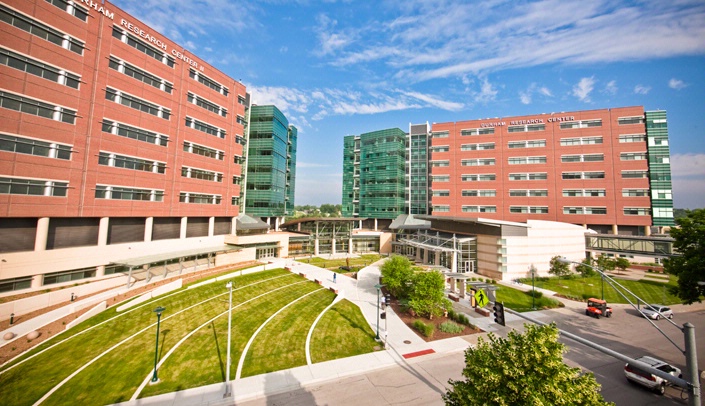Editor’s note: University of Nebraska President Hank Bounds’ full written testimony to the Appropriations Committee is available here.
University of Nebraska President Hank Bounds, Ph.D., and Board of Regents Chairman Rob Schafer were joined Wednesday by students, leaders in business and agriculture, community members and other NU supporters in asking members of the Legislature’s Appropriations Committee to make affordable, excellent higher education a priority for Nebraska’s future.
Representatives of Nebraska’s chambers of commerce, Agriculture Builders of Nebraska and the private sector; students; and a cancer patient who has received life-saving treatment at the medical center were among those testifying to the committee. In addition, hundreds of Nebraskans wrote letters to the committee voicing their support for continued investment in the university and expressing deep concerns about the impact the governor’s recommended budget reductions would have on the university’s competitiveness and affordability for students and families.
In a packed hearing room, Dr. Bounds asked legislators to consider what kind of future they envision for their children and grandchildren.
“We are at a defining moment in Nebraska’s history. We have a choice to make,” Dr. Bounds said.
“Are we going to reaffirm the partnership between the state and its public university that has opened the door of opportunity to young people and driven economic growth for almost 150 years?
“Or will you decide that you no longer see the value that the University of Nebraska provides, and make it harder for us to offer affordable and excellent education to our 53,000 students?
“. . .The university has been and will be a partner in helping you manage this challenge. But if we want Nebraska to compete, if we want this to be a place where our children and grandchildren will live and work and raise a family, if we want to build a workforce that will sustain us into the future, we have to invest in one of the primary economic drivers our state has. And that is the University of Nebraska.”
In reviewing the impact of budget reductions, Dr. Bounds noted that NU campuses currently represent a great value compared to peer institutions — but tuition increases would threaten access at a time when the workforce demands more college graduates, not fewer.
He noted that cancer rates in Nebraska are higher than the national average — including one of the highest rates of pediatric cancer in the country and the second-highest rate of pediatric brain cancer — and that Nebraska has increasing incidences of pancreatic cancer, bladder cancer, malignant skin tumors, liver cancer and thyroid cancer.
“We have some of the best cancer doctors in the nation right here in Nebraska who are working day and night to find answers. But if we don’t invest, the numbers aren’t going to improve,” he said.
Under the governor’s budget proposal, the university’s state funding would be cut $11 million this year, and next year’s appropriation would be reduced by $23 million. These represent one-third of the governor’s proposed cuts, despite the fact that the university makes up only 13 percent of state spending. And the proposed cuts represent the third cut to the university in the past year.
The governor’s recommendation has required university-wide teams to begin campus processes for budget reductions. The University of Nebraska-Lincoln, University of Nebraska at Omaha, University of Nebraska at Kearney and UNMC all released proposed cuts this week which will now be subject to campus vetting processes. These include elimination of academic programs, job reductions and a retreat from the university’s statewide presence.
Dr. Bounds said the release of the proposed cuts has made for a difficult week for the university, particularly at a time of momentum and opportunity when the university is in a strong position to help grow Nebraska’s workforce and economy. The university produces 11,000 new graduates each year for the workforce, returns $6 for every $1 the state invests and is increasingly a leader in areas important to the state and world like agriculture, cancer research and national defense.
Nevertheless, painful conversations about programmatic cuts and tuition increases are necessary, Dr. Bounds said, given that the university has already identified $30 million in operational reductions as a result of past cuts in state funding. The university has about the same number of employees supported by tax and tuition dollars today as it did in 2000, even though enrollment has grown from 45,000 to almost 53,000.
Dr. Bounds asked the committee to restore the university’s base funding to $580 million in 2018-19 in order to limit damage to NU’s trajectory and send the right message to young people, top talent and companies the state hopes to recruit.
“I’m asking you to make a choice about the future of Nebraska,” Dr. Bounds said. “I hope you will decide that the University of Nebraska is a priority for our state.”

This is only the beginning.
I certainly hope they continue to invest in the University of Nebraska. Their liver transplant department was absolutely vital to me being alive today. With all the research being worked on continously, in multiple areas in order to identify more effective treatments and ultimately cures for the diseases that are killing thousands of people. How in the would can they even consider a reduction. The University of Nebraska is instrumental for those students who wish to go to school in their home state and return to their rural homes with cutting edge technology in multiple areas. The result will ne growing and vibrant rural communities. So if you want to think long term, consider if there are no students returning to their rural roots because they have to attend out of state college to get a good edication. Then they decide to remain in the state they went to school in. Please make the wise choi e and invest in our children for generations that follow.
Sincerely,
Lori Arriola